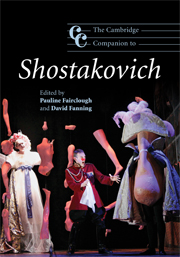11 - Slava! The ‘official compositions’
from PART III - Vocal and choral works
Published online by Cambridge University Press: 28 September 2011
Summary
The notion that after the 1948 Zhdanovshchina Shostakovich's output divided into two halves – official and non-official – is almost a truism in Shostakovich studies. Yet though it clearly drew considerable sustenance from Testimony, the idea that he had composed music to placate the Soviet authorities was mooted in the West as early as the 1960s – the decade when the West first began to be more widely aware of the growing wave of Soviet dissidence. Perhaps more surprising is the discovery that those works that were initially perceived as so compromised were not the choral pieces written soon after the events of 1948 – the cantata Song of the Forests, op. 81 and the oratorio The Sun Shines over our Motherland, op. 90 – but rather his symphonies, in particular the Eleventh and Twelfth. In fact, not one of the ‘official’ works to be discussed in this chapter was widely known in the West during Shostakovich's lifetime, for the obvious reason that they were not readily exportable. Since Western audiences rarely heard Shostakovich's more overtly political works – and since he was not generally regarded as a ‘dissident’ composer during his lifetime – they had to assume that works performed in the West such as the Fifth Symphony, the ‘Leningrad’ Symphony and the Eleventh and Twelfth Symphonies were all, to greater or lesser degrees, pleasing to Communist officialdom, as was in fact the case (that the Fourth and Thirteenth in particular had not been equally pleasing was acknowledged in the West too).
- Type
- Chapter
- Information
- The Cambridge Companion to Shostakovich , pp. 259 - 284Publisher: Cambridge University PressPrint publication year: 2008

